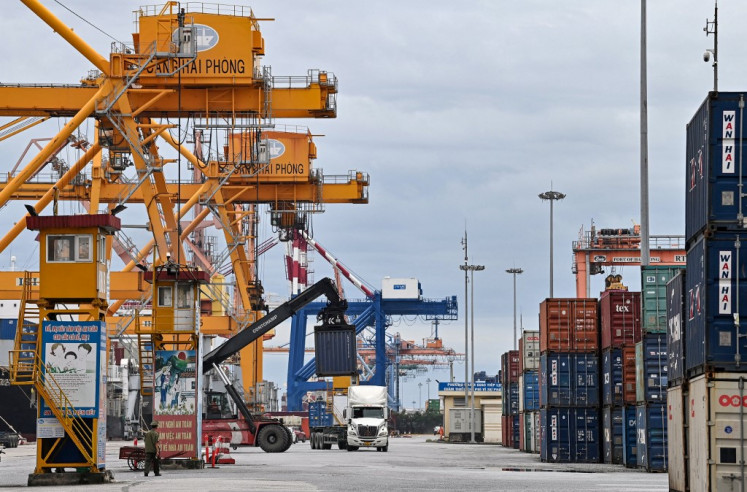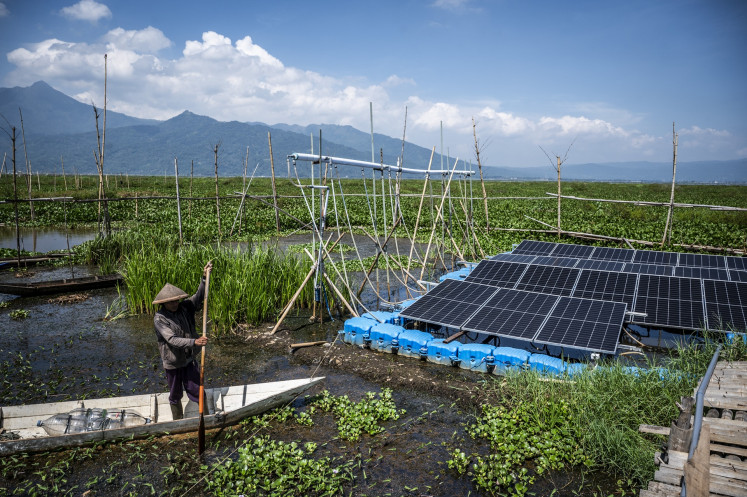Popular Reads
Top Results
Can't find what you're looking for?
View all search resultsPopular Reads
Top Results
Can't find what you're looking for?
View all search resultsInvestment follows trade
Yet more discouraging is that two implementing regulations of the Jobs Creation Law regarding export and import policies, instead of promoting open foreign trade, suggest a more restrictive trade regime.
Change text size
Gift Premium Articles
to Anyone
T
he World Bank has urged the Indonesian government to support the massive bureaucratic and regulatory-reform measures, as stipulated in the Job Creation Law, with a similarly vigorous trade reform to woo more foreign investment.
Indeed, the experiences of most countries that have been able to advance from middle-income to high-income economies, show that trade reform is needed to accommodate new, dynamic technology and to encourage domestic competition.
Indonesian experiences themselves have demonstrated how the high pace of trade flows after the introduction of open-trade regime in the mid-1960s had been followed by massive capital inflows.
However, Indonesian trade policies over the past few years have been biased against foreign products and preferred import substitution, as can be noted from the numerous non-tariff barriers imposed on imports and exports of agricultural and mineral commodities.
President Joko “Jokowi” Widodo himself has often campaigned in public speeches to promote domestic products. There is nothing wrong with such a campaign as long as the speeches do not sound like hate speech. But the “love your products” drive has often led into misguided government procurement policies.
Yet more discouraging is that two implementing regulations of the Jobs Creation Law regarding export and import policies, instead of promoting open foreign trade, suggest a more restrictive trade regime. The regulations allow the government to intervene in companies’ decisions to access imported inputs (raw materials and intermediate goods) and to export. They stipulate a more detailed mechanism on export and import approval, criteria to be importers or exporters and procedures to get the licenses.
The major technical details on the regulations are stipulated in Presidential Regulation No.32/2022 on the introduction of what is called Commodity Balance which is conceptualized as an integrated system that contains accurate and detailed data and information on planned domestic supply and domestic demand of industrial inputs. It is supposed to provide data on type, quantity and quality of goods as well as the time goods are needed by supply or demand.
The data in the Commodity Balance, which will be updated annually, will become the main reference in determining export or import quotas of particular commodities and in awarding export or import licenses. If the commodity balance says there is a domestic deficit of a commodity, then the government can impose an export ban on that good or open import. If there is a surplus, the government can open the export up just enough to close the surplus gap.
The core feature of the Commodity Balance system is data. The commodity system is supposed to have complete, integrated data on productions, demands, export and import from many related ministries. This is an important necessity since the supply and demand of inputs are controlled by different ministries.
Unfortunately, the government has been notorious with the reliability and update of its data. Even private companies, which are supposed to play an important role in gathering data for the Commodity Balance, often manipulate data for their own interests.
An unreliable database can lead to misguided policies. Daily corporate decisions on import, export and production usually need careful assessments on costs, prices, qualities, varieties, changing demands and tastes, profitability and efficiency.











